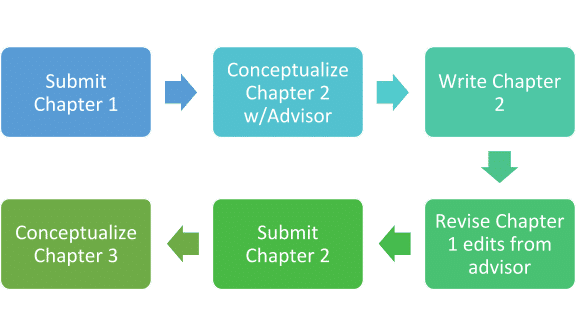This post continues our series, The Smart Scholar.
As a professor reaching the end of the spring semester, you probably have a lot on your plate. You might be grading finals and wrapping up all loose ends before summer approaches. Maybe your program is still in full swing, particularly if it operates in trimesters or quarters. No matter how this time of year affects your schedule, there’s one thing for certain: many of your students are applying for jobs, internships and graduate school. You may have been approached by a few students about writing their letters of recommendations to help them secure their first jobs. Perhaps some of your colleagues have even reached out to you, asking for a recommendation to help them secure a teaching fellowship or academic grant.
Although you’re likely writing many letters, you should try your hardest to make the piece stand out to improve your student or colleague’s chances of reaching their goal. Follow these letter of recommendation tips to create the most compelling argument possible.
1. Know when to say no
When a student or colleague asks you to write a recommendation on their behalf, it’s important that you ask yourself the following questions:
- Do I know this colleague or student well enough to write a convincing letter?
- Do I have the time to write the letter?
- Am I the best fit as a letter writer for this candidate?
If you’ve said no to any of these questions, it may be best to decline the request to write a letter of recommendation. Even though saying no feels like you’re letting your student or colleague down, you’re really helping them in the long run. A hiring manager or scholarship committee can see right through a letter from a recommender who does not have a close relationship with the applicant. Likewise, you’re less likely to produce a convincing letter if you have to rush through it. This is unfortunate for the candidate because there may have been a better letter writer who could speak with more conviction about their qualifications for the award, job or university admittance.
When you politely decline, explain your reasoning to the student or colleague. They may feel the stress of having to find a new contact to write a letter on their behalf, but they will likely understand where you’re coming from and may even thank you in the end.
2. Create a timeline
The application process can be stressful and intense for individuals who are looking to advance their careers or education. For that reason, they may not have stayed on top of their own scheduling goals, causing them to leave a great deal of their work to the last minute. You may have a colleague or student reach out to you about writing a letter of recommendation with an unrealistic window of time to complete it. In order to set yourself (and the applicant) up for success, we suggest sharing the following timeline with anyone looking for a reference letter:
- I will need two to three weeks to write the letter.
- After writing the letter, I will need one or two weeks to edit the letter.
- After editing the letter, I will need one week to either submit the letter electronically or mail the letter to the appropriate person.
Having a transparent, realistic timeline will give you more than enough time to complete the task, while providing yourself some wiggle room in case you get caught up with other tasks. More importantly, it helps the applicant know how much time they will need to give you before the application deadline. It’s important to be straightforward and honest in this type of situation so that everyone is clear about how long it will take for you to write the letter of recommendation.
3. Decide what to put in the letter
In order to write an effective reference letter, you’ll need to determine exactly what information should go into it. Here are some important components to include when you are writing a recommendation letter:
- A compelling opening
- Your relationship to the candidate
- Personal qualities about the candidate
- Candidate’s problem-solving skills
- Candidate’s understanding of a related subject area
- Information about their communication and interpersonal skills
- A closing that ties together all the reasons you believe the candidate is qualified
Don’t forget to include some basic information about yourself as well for credibility. Here are additional pieces you’ll want to add about yourself:
- Full name
- Job title
- Years in the profession
- Contact information, such as your phone number and email address
4. Ask for a draft template
Whether or not you’ve written letters of recommendation related directly to your students’ or colleagues’ academic and career pursuits before, you may want to work from a sample letter. Request that the applicant send along a draft template related to the program or job title they are applying for. Not only can this help you in the letter writing process, it can ensure that you write the best piece possible on their behalf. With a draft to guide you through the letter writing process, you’ll know the proper angle to take that speaks to the requirements and expectations of the school, job position or award the applicant is seeking. In addition, it can cut down on the amount of time it takes you to write the letter, as you’ll have a good jumping-off point to work from.
5. Request specific information
Even though you’ll be the major player responsible for drafting and sending the letter of recommendation, it’s crucial that the person requesting the letter meets you (at least) halfway, providing you with adequate information about the role itself. Your letter focus should be about the candidate, naturally, but you’ll need some details about their goals and aspirations, as well as how they connect with the desired role.
Ask that your student or colleague send along their resume, cover letter or personal statement, academic transcript and information about the graduate school, award or job itself. Request a copy of the program or job description; that way, you can see exactly what the organization or admissions officers are looking for from ideal applicants. This can help you craft the right narrative, highlighting the candidate’s strengths that relate directly to the expectations of the role or program.
6. Make it personal
A reference that only touches on technical characteristics of the applicant – such as academic performance and work experience – doesn’t create a compelling argument for the candidate. Since a majority of this information likely appears on the candidate’s resume, you’re likely regurgitating what is already clear. What their resume, cover letter, statement of purpose and other documents do not reveal, however, is what it’s like to work with them. As a recommender, you can reveal information that a graduate school or potential employer wouldn’t know about the applicant from reading their cover letter and resume alone. Feel free to divulge observations of their work ethic, character strengths and other personal qualities that make them a compelling candidate. Something that many recommenders shy away from is revealing speed bumps the applicant faced. However, a graduate school or employer may be interested in seeing how the candidate dealt with failure or difficulty and what they did to work through their struggles.
7. Follow through with your role as a mentor
Since your student or colleague has requested that you write a letter of recommendation on their behalf, it’s evident that they look up to you as a leader and role model. This should be an honor, as their respect for you has compelled them to ask you for assistance on a crucial aspect of the application process. After you’ve completed your letter, don’t hesitate to ask the student or colleague if they need any assistance or guidance throughout the other elements of the application process. Perhaps they need to interview for a role or program and would like some help preparing for this meeting. If they get into the program or are offered the role, don’t let this be the last time they hear from you. Offer yourself as an ongoing mentor, providing them with an advisor, confidante and networking contact that they can utilize throughout the duration of their career.
There are plenty of resources you can turn to when looking for teaching inspiration. Most of these sources will advise you to make and maintain efficient working relationships with students and colleagues. Positive results that can benefit from relationship building include improved workplace and classroom culture, ongoing networking opportunities and increased respect and authority within your field.
8. Submit the letter the right way
Once you’ve created an effective letter of recommendation, you can take a deep breath. You’ve finished the toughest part of the process. Now you’ll need to think about how you’ll submit your reference. Maybe you think it’s the best idea to send the letter directly to your student or colleague; that way, they can do what they like with it. They may also prefer you to send it directly to the graduate school or organization and notify them when you’ve turned it in.
Perhaps you’d rather send the reference letter to the graduate institution or organization confidentially, without the applicant having immediate access to it. You might prefer the sense of freedom this style of submission gives you, as it takes away the pressure of a student or colleague nitpicking your word choice. You can submit a letter confidentially in any of the following ways:
- Mail it directly to schools or organizations
- Utilize Interfolio’s Dossier Delivery system
If you’ve never utilized Interfolio’s technologies before when writing and asking for recommendation letters, you might consider implementing this platform into your process. When you choose to work with Interfolio, you can experience the following benefits:
- A place to store past letters to candidates
- Guaranteed letter confidentiality, if you’d prefer the privacy
- A customer service team that’s ready to act on your requests
- A quality control check that makes sure the letters you’re turning in have all the required components, such as an official letterhead, signature and relevant contact information
Whether you choose to submit your letter of recommendation through “snail mail” or Interfolio’s seamless technology, follow these letter of recommendation tips to help your student or colleague stand out among the other candidates. The right content, details and mixture of personal details and academic or professional skills can create a compelling argument that sets your contact up for success when applying for graduate school or career opportunities.
What other strategies do you have when writing a letter of recommendation? Please feel free to share with me on Twitter (@ramongoings).
In addition to an online platform for universities to manage faculty reviews, Interfolio’s Dossier enables scholars to collect, curate, polish and send out their materials at all stages throughout their academic professional path. Learn more about Dossier here.
Author Bio: Dr. Ramon B. Goings is an assistant professor of educational leadership at Loyola University Maryland. His research examines gifted/high-achieving Black male academic success PreK-PhD, diversifying the teacher and school leader workforce, and the student experience and contributions of historically Black colleges and universities to the higher education landscape. As a writing coach and editor, Dr. Goings enjoys supporting the scholarly development of doctoral students and professors in higher education. For more information about Dr. Goings, please visit his website www.ramongoings.com and follow him on Twitter (@ramongoings).











